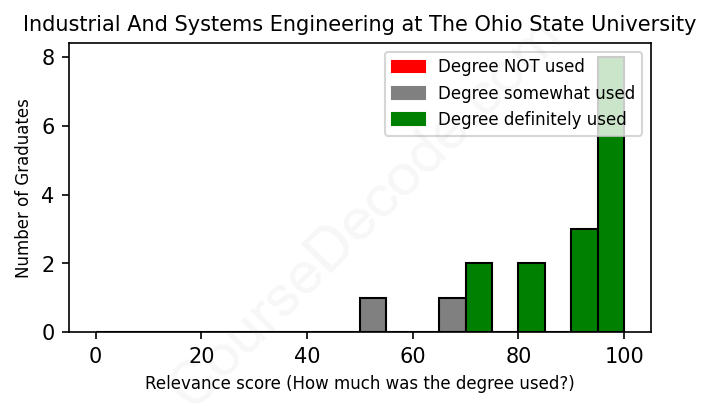
First, some facts. Of the Industrial And Systems Engineering graduates from The Ohio State University we've analyzed , here's how many have used (or NOT used) their degree in their career:

These are estimates based on AI analysis of 17 LinkedIn profiles (see below).
The verdict? Great! Overall, with an average relevance score of 88%, Industrial And Systems Engineering graduates from The Ohio State University have a substantially higher likelihood (+21%) of finding work in this field compared to the average graduate across all fields:
And for comparison, here's the chart for all profiles we've looked at across all degrees.
Also, after graduating, only 29% of these graduates have pursued further education other than another Bachelor's degree (such as a Masters degree or other), compared to the average across all profiles of 35%. This suggests a Bachelors degree is enough for most Industrial And Systems Engineering graduates, and it's normal to look for work straight after graduation.
See the details:
|
Relevance score: 94% We think this person has gone into a career highly relevant to their degree. We think this person has gone into a career highly relevant to their degree.
DEGREE INFOGraduated in 2021 from The Ohio State University with a Bachelor's degree in Industrial And Systems Engineering. No other secondary education since. JOB HISTORY SINCE GRADUATIONPoject Engineer - Operations for Engineers Leadership Development Program Eaton Jun 2021 - Jul 2022 Supply Chain Associate - Operations Management Leadership Development Program at Eaton  Eaton Jul 2022 - Jun 2023 Quality Supervisor - Operations Management Leadership Development Program  Eaton Jul 2023 - Apr 2024 Functional Consultant  Prometheus Group Apr 2024 - Present ABOUTYoung Professional with a wide variety of experience in Engineering, Manufacturing/Operations, and Tech Consulting. |
The top 10 most common jobs done by the graduates we've analyzed (ranked most common to least) are:
From analyzing the job profiles of alumni who graduated with a degree in Industrial and Systems Engineering from The Ohio State University, it’s clear that many have secured roles heavily aligned with their field. The most common positions seem to be in roles like operations management, supply chain management, and various engineering specialties, especially in organizations like NASA and major corporations like UPS and Owens Corning. These positions typically require the application of systems thinking, process optimization, and data analysis—skills that are central to Industrial and Systems Engineering. For instance, roles like Operations Industrial Engineer, Supply Chain Consultant, and Demand Planning Analyst directly utilize the competencies developed during their studies.
However, not all job positions are equally relevant to the degree. Some alumni found themselves in roles that require only a fraction of the skills they honed during their studies. Jobs like Commodity Buyer and Management Consultant may involve some analytical skills, but they don't fully tap into the engineering principles that are the cornerstone of Industrial and Systems Engineering. Overall, while a significant number of graduates have secured jobs that directly connect to their educational background, there are instances where the relevance of their positions is limited. It’s a mix of both worlds, depending on the specific job description and industry context.
Here is a visual representation of the most common words in job titles for Industrial And Systems Engineering graduates (this is across all Industrial And Systems Engineering graduates we've analyzed, not just those who went to The Ohio State University):

The graduates from The Ohio State University who studied Industrial and Systems Engineering seem to have carved out some pretty solid career paths. For many, their first jobs post-graduation are often analytical or engineering positions, like demand planning, supply chain analysis, or continuous improvement roles. For instance, graduates from the early 2010s took on roles like supply chain consultant and engineering intern, which are quite relevant to their degree. This trend continues into mid-career where we see many individuals moving into managerial or more specialized roles, demonstrating that they’ve built upon that early experience effectively.
Fast forward five to ten years, and many of these alumni are holding significant positions within reputable companies like Accenture, NASA, and even major corporations. There’s a noticeable trend of graduates progressing into senior roles in supply chain management, operations, and engineering, often staying within fields closely linked to what they studied. Whether it's in aerospace at NASA or through leadership development programs in big corporations, it's clear that these degrees have provided a strong foundation for meaningful careers. So overall, it looks like Ohio State’s Industrial And Systems Engineering graduates are doing quite well for themselves in relevant careers!
Honestly, getting a Bachelor’s degree in Industrial and Systems Engineering can be pretty challenging, especially at a big school like The Ohio State University. You’re looking at a mix of math, engineering principles, and systems thinking, which means you’ll have to get comfortable with everything from calculus to optimization techniques. Many students find the coursework demanding but manageable if they stay organized and don’t hesitate to ask for help when they need it. On the whole, it’s not necessarily harder than other engineering degrees, but it definitely requires dedication and strong problem-solving skills. If you enjoy tackling complex challenges and are willing to put in the time and effort, you can definitely handle it!
Most commonly, in the LinkedIn profiles we've looked at, it takes people 4 years to finish a Bachelor degree in Industrial And Systems Engineering.
Looking at the career paths of these Industrial and Systems Engineering grads from Ohio State, it seems like they've generally landed some pretty solid jobs and seem to be making decent money. Most of them started with internships or entry-level positions and then moved on to more senior roles at reputable companies like NASA, JPMorgan Chase, and IBM, which is awesome. Those working at places like NASA are particularly likely to be raking in a good salary, while even the consultants and managers at various firms can do pretty well. It's clear that this degree opens up some good doors, so if you're thinking about pursuing engineering, it looks like it could be a wise choice for your future earnings!
Here is a visual representation of the most common words seen in the "about" section of LinkedIn profiles who have a Bachelor degree in Industrial And Systems Engineering (this is across all Industrial And Systems Engineering graduates we've analyzed, not just those who went to The Ohio State University). This may or may not be useful:

Here are all colleges offering a Bachelor degree in Industrial And Systems Engineering (ordered by the average relevance score of their Industrial And Systems Engineering graduates, best to worst) where we have analyzed at least 10 of their graduates:
| College | Score | Count |
|---|---|---|
 The Ohio State University The Ohio State University
|
88 | 17 |
 Virginia Tech Virginia Tech
|
85 | 12 |
 Georgia Institute of Technology Georgia Institute of Technology
|
78 | 13 |
 University of Florida University of Florida
|
75 | 13 |
 Virginia Polytechnic Institute and State University Virginia Polytechnic Institute and State University
|
71 | 12 |